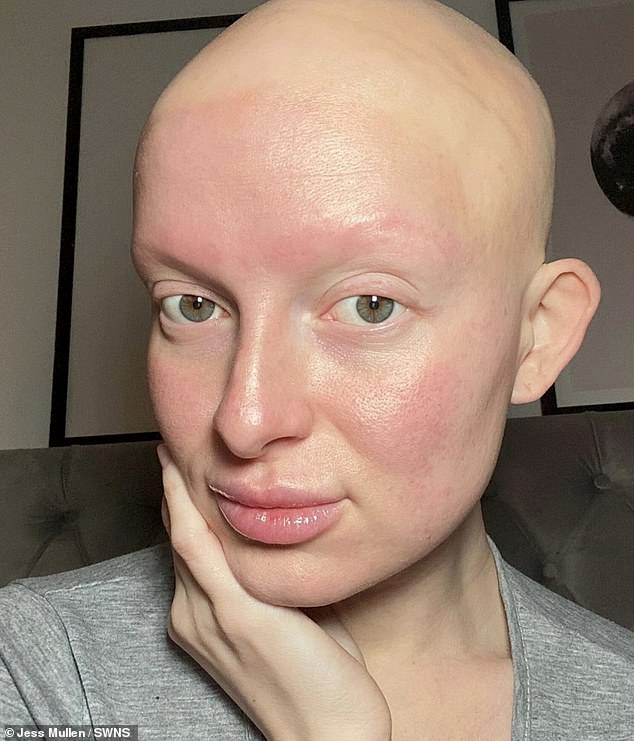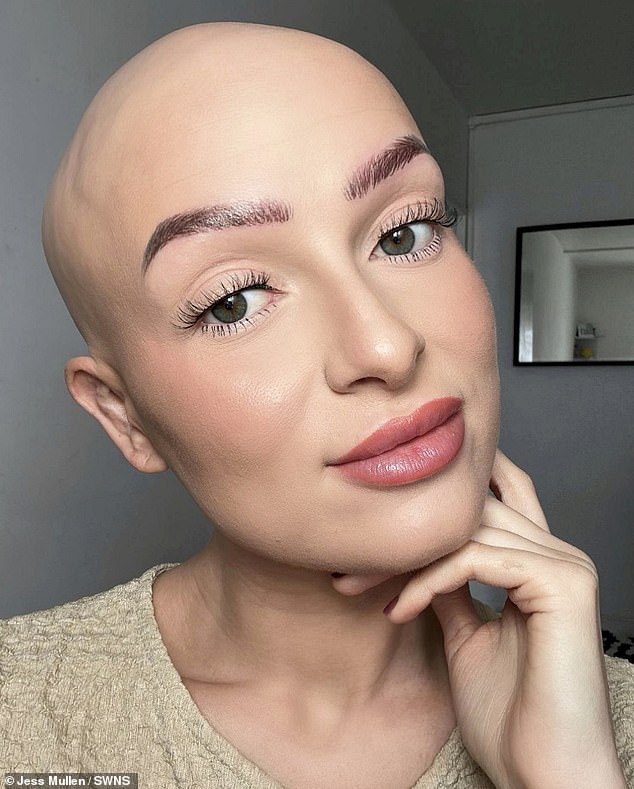I do my hair and eyebrows for work the night before and then sleep in them to save time in the mornings – it feels like second nature to me now
A woman has revealed how she does her hair and make-up before work every night and then sleeps in it to save time in the morning.
Jess Mullen, 27, from Greenwich, London, says the routine is now ‘second nature’ to her.
When she was just 16, Jess, who works as a childcare worker, was diagnosed with alopecia areata, which caused her eyebrows and eyelashes to fall out.
Unfortunately, this then developed into alopecia universalis, which led to Jess losing all the hair on her scalp and body.
For two years, Jess, who has 121,000 Instagram followers, struggled to find the confidence to leave her home and build a collection of wigs.
Jess Mullen (pictured), 27, lost her hair, eyebrows and eyelashes when she was just 16 years old

Jess stuns with a fiery red lip and red hair, thanks to her vast collection of wigs and make-up expertise
After sharing her journey of self-acceptance online, Jess now feels ‘amazing’ and can leave the house without her wigs and make-up done.
However, Jess says she still feels more comfortable wearing wigs around the children she works with, as she worries they will be ‘scared of her’.
She spends half an hour the night before work putting on her wig and applying eyebrow transfers, but applies any makeup in the morning.
Jess said, “It takes so long to get ready in the morning. I started it the night before.
‘I put on my eyebrows and my wig. Normally it takes about half an hour. I feel like it’s second nature.”
She first noticed a strand of hair had fallen out after completing her final exams in 2013, but this was dismissed by doctors as the cause of her hair being tied too tightly in a bun.
But a month later, Jess suddenly lost all her hair – including her eyebrows and eyelashes – and was diagnosed with alopecia.
Jess said: ‘I was the kind of girl who loved my hair. I was always busy setting the trend: dyeing it, cutting it into a bob. It was traumatic to lose it.”

All natural: Jess always worried that her natural appearance would worry the children she worked with, but she is greeted with a smile
The 27-year-old admitted: ‘There was a two-year period where I didn’t date. That’s when I got up the courage to try making a wig.’
She said the wigs made her feel more confident, but she still wouldn’t leave the house without a wig.
Gradually she realized that she couldn’t change anything and started to feel like she could leave the house without a wig and without eyebrows.
She said: ‘I became more confident. I knew there was nothing I could do to change who I am.”

Jess Mullen, 27, was diagnosed with alopecia in 2013 at the age of 16, shortly after graduating from high school. Here she stuns with a matte brown lip and shimmering green eye look

Jess likes to experiment with her appearance. Here she has a natural pink lip and has applied a soft application
Jess started an Instagram page in 2018 and connected with others like her.
She said: ‘It made me feel more comfortable and confident. I can go out bald. I love the person I am’.
Despite this, Jess still has days where she doesn’t feel so confident and tends to wear a wig for work.
She said: ‘I was worried the children would be scared, but I have gone without a wig a few times and they have smiled and seen me for who I am.’
Jess gets ready the night before to ensure she looks glamorous in her wigs and has a wardrobe filled with boxes of around 50 to 80 wigs, happy to be able to change her hair color whenever she wants.

Jess pictured as a child, with a full head of hair. The social media star says her diagnosis initially damaged her self-confidence

Here is Jess 16, pictured just before she lost her hair. She said: ‘It made me feel more comfortable and confident. I can go out bald. I love the person I am’.
By sharing her story on social media, Jess now wants other people to know they are not alone.
She said: ‘You may feel like an alien, but you don’t have to feel like you’re alone.
“If you have a visual difference, it’s okay to feel the way you feel: sad or anxious.
‘I am who I am, you can be that way too’.
